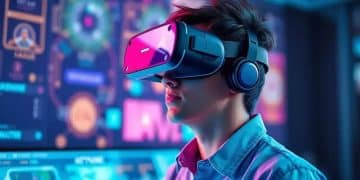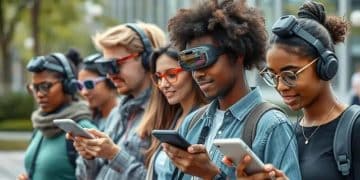AI-generated media trends that will shape the future

AI-generated media trends are transforming content creation by automating processes, enhancing personalization, and integrating immersive technologies like AR and VR, ultimately reshaping user experiences and interactions with media.
AI-generated media trends are rapidly evolving, reshaping how we consume and interact with content. Ever wondered how these trends are influencing your daily media experience? Let’s dive into the fascinating world of AI.
Key trends in AI-generated media
The landscape of media is changing rapidly due to AI-generated media trends. These trends are not just about technology; they’re about how we interact with content in our everyday lives. New innovations are reshaping the way we create, consume, and share media.
Personalization in Media
One significant trend is the growing personalization of media content. AI allows platforms to tailor experiences based on individual preferences and behaviors. As a result, users receive content that resonates more personally.
- Enhanced user engagement
- Increased content relevance
- Better targeting of audiences
- Improved user satisfaction
As we see this shift, content creators must understand their audience better. AI helps by analyzing user data and delivering insights that inform content strategies. However, embracing this customized approach raises questions about privacy and data security.
Automation in Content Creation
Another trend is the automation of content creation. AI tools can now generate articles, videos, and even art, saving time and costs. Many businesses are utilizing AI to produce high-quality content quickly.
This automation leads to exciting possibilities. For example, imagine producing a full-length article in minutes instead of hours! However, relying heavy on AI for creative processes does spark discussions on originality and authenticity.
The Rise of Deep Learning Techniques
Deep learning is revolutionizing how media is created. These advanced algorithms help enhance the quality of images and videos while making them more accessible. They can produce stunning visuals that catch the eye and rank highly on platforms.
- Improved image recognition
- Enhanced video generation capabilities
- Realistic simulations and animations
- Greater creativity in media production
The ongoing innovations remind us that the future of media lies in the fusion of human creativity and AI technology.
Impact of AI on content creation

The impact of AI on content creation has been transformative. By integrating AI into various stages of the content lifecycle, creators can achieve enhanced efficiency, creativity, and personalization. This change is reshaping the way we think about producing and sharing information.
Enhancing Creative Processes
AI tools assist writers and artists in generating new ideas and concepts. For instance, algorithms can analyze vast amounts of data to suggest topics that engage audiences. This helps content creators stay relevant and appealing.
- Automated idea generation
- Data-driven insights into audience preferences
- Quick adaptation to trending topics
- Increased creativity in content styles
By leveraging AI technology, creators can explore new avenues in storytelling. They can take inspiration from audience data and tailor their work to suit evolving tastes.
Streamlining Production Processes
Moreover, AI significantly streamlines production processes. Tasks such as proofreading, editing, and optimizing content for SEO can now be automated. This allows creators to focus more on crafting their message rather than getting bogged down in technical details.
With these advancements, the quality of produced content often improves as well. AI ensures that pieces are polished, consistent, and more likely to perform well in search engines.
Rethinking Audience Engagement
AI is also redefining how we engage with our audience. Personalized content has become easier to create, with algorithms curating experiences tailored specifically to user interests. People now consume content on platforms that adapt to their preferences, leading to deeper connections with brands.
- Targeted marketing strategies
- Personalized user experiences
- Better feedback mechanisms
- Higher retention rates of users
This shift in engagement strategies encourages brands to interact meaningfully with their audience. As AI continues to advance, the relationship between content creators and consumers will evolve further.
Social implications of AI-generated content
The social implications of AI-generated content are profound and far-reaching. As AI continues to produce text, images, and videos, it influences how we share and consume information. This shift raises important questions about ethics, authenticity, and community interaction.
Ethical Concerns
One major concern is the ethical use of AI in content creation. Who is responsible when AI produces misleading or harmful material? As content becomes more automated, accountability can become blurred.
- Potential for misinformation
- Questions of authorship
- The risk of deepfakes
- Impact on trust in media
These issues challenge content creators, educators, and consumers. Everyone must be aware of how AI can influence and sometimes distort reality.
Changing Interactions
AI-generated content also alters how we interact online. People may find themselves engaging more with personalized and curated content. This can enhance the user experience, but it also leads to echo chambers.
When algorithms shape our feeds, we may miss diverse perspectives. Without balanced viewpoints, social polarization can increase, leading to divisions in opinion and belief.
Community Building and Engagement
On the positive side, AI can foster community building. For instance, AI tools help creators connect with their audiences through tailored experiences. This connection can generate a sense of belonging and enhance user loyalty.
- Improved audience feedback mechanisms
- Increased engagement through personalized content
- Strengthened relationships between creators and audiences
- Opportunities for collaboration across diverse communities
As AI evolves, it will continue to reshape our social landscapes, influencing how we communicate and build relationships.
Future predictions for media and technology

The future predictions for media and technology reveal exciting changes that will redefine how we interact with information. As technology continues to advance, AI will play a crucial role in shaping media landscapes.
Increased Automation and Creation
One significant trend will be the increased automation in content creation. AI programs will become even more sophisticated, capable of producing high-quality articles, videos, and designs with minimal human intervention.
- Faster content generation
- Lower production costs
- More diverse content types
- Broader accessibility for all creators
This evolution will empower both businesses and independent creators, allowing them to scale their efforts and connect with wider audiences.
Augmented and Virtual Reality Integration
Another prediction involves the integration of augmented reality (AR) and virtual reality (VR)
Imagine attending a concert or exploring a museum from your living room! As AR and VR become more mainstream, they will revolutionize how we experience events and storytelling. The future will also see an unprecedented level of personalization in content delivery. AI algorithms will analyze individual preferences and behaviors to tailor media experiences uniquely to each user. As a result, audiences will engage more deeply with content that resonates with them, fostering a stronger connection between creators and consumers. With these advancements, we must also address ethical considerations in media. Issues like data privacy, misinformation, and content authenticity will need careful examination as AI technologies evolve. Future regulations may emerge to protect users and ensure responsible innovation, balancing the benefits of technology with the rights of individuals. AI is revolutionizing content creation by automating processes, enabling faster output, and providing data-driven insights for more engaging material. Concerns include misinformation, data privacy, and the accountability of content creators when using AI to produce material. Yes, AR and VR will create more immersive experiences, allowing users to engage with content in new and interactive ways. Personalized content enhances user experience by delivering relevant material tailored to individual preferences, increasing satisfaction and engagement.Enhanced Personalization and User Experience
Ethical Considerations and Regulation
FAQ – Frequently Asked Questions about AI and Media Technology
How is AI impacting content creation?
What are the ethical concerns related to AI-generated media?
Will AR and VR change the way we consume media?
How can personalized content benefit users?






